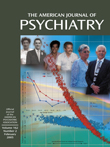Dr. Veen and Colleagues Reply
To the Editor: We are grateful to Mr. Wade for his interest in and comments on our article. He is right to underline the strong association between younger age and use of cannabis. As a consequence, one should be cautious in assuming that the association between cannabis use and age at a first psychotic episode is causal. However, our research has suggested that the association was specific for the age at first psychotic episode because the impact of cannabis use on age at first social or occupational dysfunction was not significant. On that account, we have suggested that cannabis use may cause or contribute to a younger age at the first psychotic episode.
We also appreciate the interest of Dr. Krebs and colleagues in our study. The suggestion of an individual sensitivity to cannabis is interesting, and we would welcome further studies that examine this issue. However, we do not agree with the suggestion made by Dr. Krebs et al. that their findings contradicted our results. First, it remains unclear whether the samples they examined were representative of schizophrenia patients in general. Second, the authors do not state whether they adjusted the differences in age at onset between cannabis-sensitive patients and the remaining patients (or between cannabis users and nonusers) for gender. Finally, since the findings reported by Krebs et al. are significant (p=0.04) or almost significant (p=0.07), they seem to support, rather than contradict, our findings.



